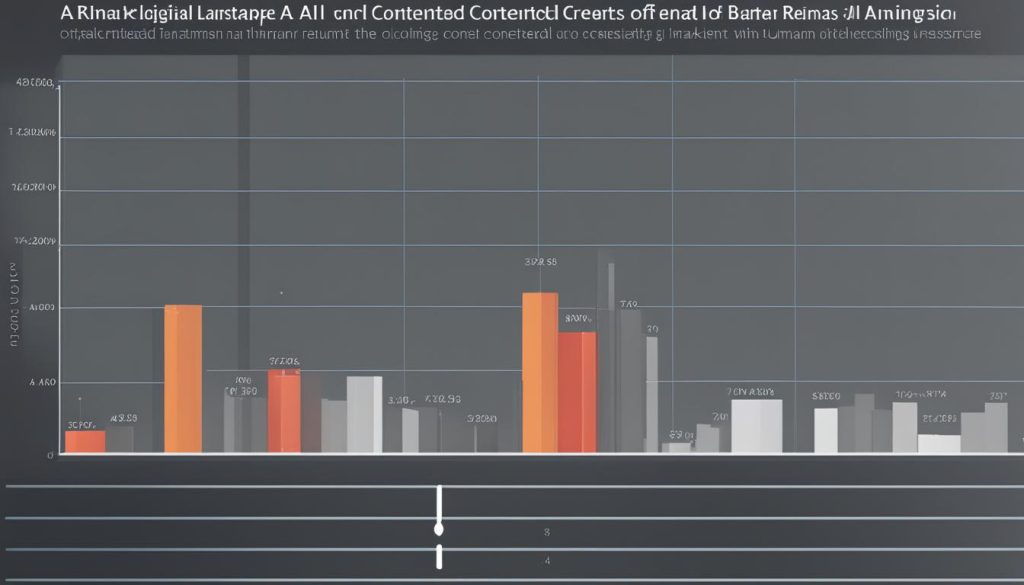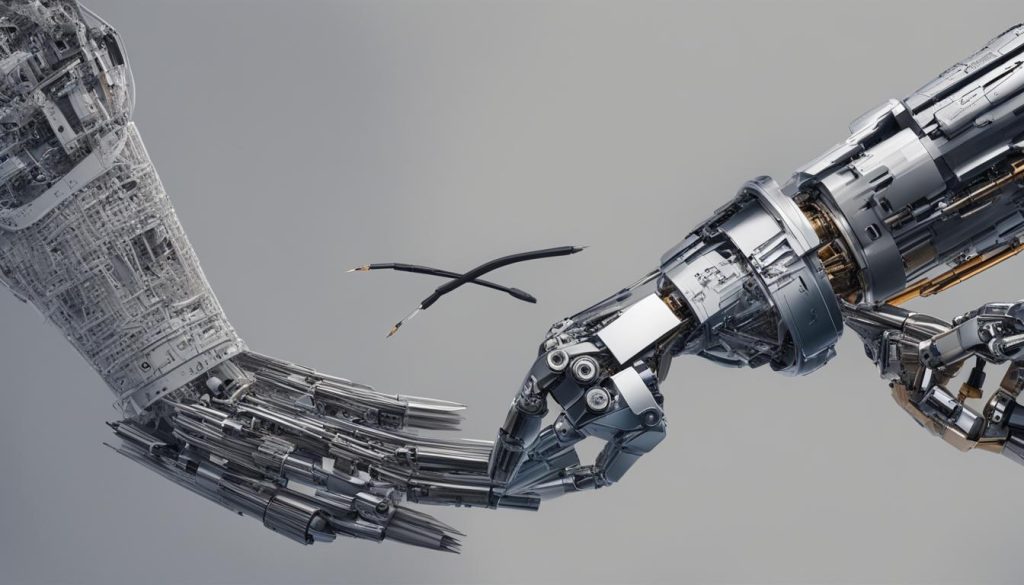Artificial Intelligence (AI) has transformed numerous sectors, particularly highlighting its role in the affiliate marketing domain. The arrival of AI solutions, such as ChatGPT, has notably propelled discussions concerning the comparison between AI-generated content and that produced by humans. This piece aims to examine AI’s effect on content creation within affiliate marketing, highlight its advantages, and evaluate the necessity of human input for generating effective affiliate content.
Key Takeaways:
- AI-generated content is a hot topic in the marketing industry
- AI tools like ChatGPT offer efficiency and scalability in content creation
- Human-written content brings a personal touch and creativity to affiliate marketing
- A balanced approach combining AI and human expertise can lead to high-quality and engaging affiliate content
- Understanding the benefits and limitations of AI is crucial for successful content creation
What Is AI Content?
AI content refers to content generated by computer programs such as ChatGPT and Google Bard. These AI applications leverage natural language processing techniques and machine learning algorithms to create content based on user-supplied input, such as keywords, templates, and queries. AI content creation has revolutionized the way businesses and marketers approach content creation, offering an efficient and scalable solution for meeting the increasing demand for high-quality content.
One of the key advantages of AI content is its ability to scale content creation. Traditional content creation methods often require a significant amount of time and resources to produce large volumes of content. With AI, businesses can streamline their content production process and generate articles, blog posts, social media content, and more in a fraction of the time it would take for humans to create the same amount of content.
Furthermore, AI content creation tools can help businesses optimize their content for search engines. By analyzing patterns and trends in search engine optimization, these tools can generate content that aligns with best practices for improving search rankings. This enables businesses to generate SEO-friendly content at scale, ensuring their website and online platforms are more visible to their target audience.
However, it is important to recognize that there are limitations and concerns associated with AI content creation. While AI-generated content may be efficient and able to meet certain content needs, it may lack the nuanced creativity, personal touch, and human emotion that human-written content can offer. Additionally, there are ongoing debates about the ethical considerations and potential biases that AI content creation might introduce.
Despite these limitations, the advancements in AI content creation have transformed the digital marketing landscape, providing businesses with powerful tools to enhance their content creation process and scale their online presence. By combining the strengths of AI-generated content with the human touch of professional writers and editors, businesses can create compelling and engaging content that resonates with their audience.
Google’s View on AI Content
When it comes to AI content, Google takes a similar stance as it does for human-created content. The primary goal of Google’s ranking system is to provide users with high-quality and helpful content. Google evaluates AI-generated content based on its usefulness, originality, and ability to meet E-A-T (Expertise, Authoritativeness, Trustworthiness) requirements. If AI content satisfies these criteria, it has a strong chance of ranking well in search results.
Google’s guidance on AI-generated content emphasizes the importance of creating content that is valuable, credible, and user-focused. The goal is to ensure that AI-generated content provides genuine value to users and meets their search intent effectively.
However, it is essential to note that AI content created solely for the purpose of manipulating search rankings may face penalties from Google. Content that aims to deceive or mislead users is not aligned with Google’s mission to provide reliable and authoritative information.
By understanding Google’s perspective on AI content, content creators can optimize their AI-generated content to align with Google’s guidelines and improve their chances of ranking well in search engine results.
If we look at AI content and SEO rankings, we can see that AI content has the potential to perform exceptionally well if it meets the necessary criteria set by Google. This reinforces the idea that AI-generated content can be a valuable tool for content creators in achieving their SEO goals.
So, how can you ensure that your AI-generated content aligns with Google’s expectations? Let’s take a closer look at Google’s guidance on AI-generated content to understand how you can optimize your AI content for improved SEO performance.
Can AI Content Rank Well?
AI-generated content has the potential to rank well on search engines like Google, provided it meets certain criteria and satisfies user search intent. To secure a high ranking, AI content should be useful, helpful, original, and demonstrate expertise, authoritativeness, and trustworthiness (E-A-T).
Several companies have successfully published AI-generated content that performs exceptionally well in search engine rankings. For example, Bankrate.com has leveraged AI to create informative and comprehensive financial guides that consistently rank on the first page of Google search results. Similarly, Buzzfeed has utilized AI to produce engaging and shareable content that attracts a large organic traffic base.

It’s worth noting that not all AI-generated content will automatically rank well. Just as with human-created content, performance in search engine rankings depends on various factors, including competition, keyword optimization, relevance, and quality. To enhance the chances of AI content ranking well, it’s crucial to focus on understanding user search intent and targeting important ranking factors.
Examples of AI-Generated Content Ranking Well:
| Company/Website | Industry/Niche | Content Type | Ranking Achievement |
|---|---|---|---|
| Bankrate.com | Finance | Financial guides | Consistent first-page rankings |
| Buzzfeed | Entertainment | Listicles and articles | High organic traffic |
| [Company/Website] | [Industry/Niche] | [Content Type] | [Ranking Achievement] |
In addition to these prominent examples, smaller publishers and businesses have also experienced positive outcomes with AI-generated content, seeing an increase in organic traffic and improved search engine rankings. However, achieving success with AI content requires a thoughtful approach that aligns with user expectations and search engine algorithms.
AI Content Quality vs. Human Content Quality
Today’s AI tools have made significant advancements in generating high-quality content, especially in terms of spelling and grammar. AI text generators, such as ChatGPT, often produce error-free drafts on the first try. However, despite these advancements, there are inherent limitations to AI-generated content that prevent it from fully replicating the quality and finesse of human-written content.
While AI can excel in technical accuracy and efficiency, it may lack the creativity, emotion, and personal touch that human writers bring to their work. Human authors have the ability to infuse their writing with unique perspectives, engaging narratives, and an innate understanding of their audience. These elements collectively contribute to the overall quality of the content and its ability to resonate with readers on a deeper level.
Another aspect where AI-generated content may fall short is its potential for being repetitive and less readable. AI algorithms can sometimes produce formulaic and monotonous writing, lacking the natural variation and cadence that human writers effortlessly incorporate. This can impact the overall user experience and may result in decreased engagement and interest.
Thus, the best approach to content creation is a hybrid one that combines the strengths of AI tools with the human touch. By leveraging AI text generators to streamline the initial content creation process, human writers can then step in to add the necessary creativity, emotion, and personalization that enhance the content’s quality and impact. This way, businesses can benefit from the efficiency and accuracy of AI while ensuring the content resonates with their target audience.
The Role of Human Intervention in AI Content Creation
Human intervention can significantly elevate the quality of AI-generated content and address its potential limitations. Here are a few key ways in which human writers can contribute:
- Injecting creativity: Human writers can bring their unique perspectives, creative thinking, and storytelling abilities to make the content more engaging and memorable.
- Adding emotion and empathy: Humans have a natural ability to empathize and connect with readers on an emotional level, infusing the content with authentic emotions and relatable experiences.
- Ensuring readability: Human intervention can help refine and polish the AI-generated content to improve its flow, tone, and readability, making it more accessible to the target audience.
- Ensuring factual accuracy: While AI can provide a wealth of information, humans excel in fact-checking, verifying sources, and ensuring the accuracy of the content.
By striking the right balance between AI-generated content and human intervention, businesses can achieve the optimal combination of efficiency, accuracy, and quality in their content creation process.
Actionable Advice in AI Content vs. Human Content
When it comes to providing actionable advice to readers, ensuring the accuracy of AI-produced content is crucial. While AI tools offer efficiency and speed in content creation, they also have limitations that can impact the reliability of the advice they provide.
One significant concern with AI-generated content is the potential for biases. AI systems learn from data, and if the underlying data contains biases, those biases can be reflected in the content generated. This can result in the dissemination of offensive or inaccurate information.
Additionally, it is important to note that AI content should not be relied upon for medical and financial advice. In these specialized fields, content should be produced by real experts with relevant experience. Google expects content creators in these niches to have expertise and authoritativeness.
To ensure the accuracy and trustworthiness of AI-generated content, thorough fact-checking is essential. This applies not only to AI-generated content but also to human-created content. Fact-checking helps to maintain credibility and prevents the spread of misinformation.
In summary:
- Monitor AI-produced content for accuracy and biases.
- Avoid using AI-generated content for medical and financial advice.
- Fact-check both AI-generated and human-created content to maintain accuracy and trust.
“Fact-checking is crucial for both AI-generated and human-created content to maintain accuracy and trust.”

| Advantages of AI-Produced Content | Drawbacks of AI-Generated Content |
|---|---|
| Cost-effectiveness | Lack of personalization and human touch |
| Scalability | Potential biases and inaccuracies |
| Faster turnaround times | Repetitiveness and less readability |
| Improved search engine optimization | Lack of creativity and emotional connection |
| Error reduction |
Pros and Cons of AI Content Generation
AI content generation has revolutionized the way businesses create and scale their content. With advanced AI-powered tools, companies can now produce high-quality articles at a fraction of the time and cost. However, while AI content generation offers many benefits, it also comes with its own set of drawbacks.
Benefits of AI Content Generation
- Cost-effectiveness: AI tools eliminate the need for hiring multiple writers, reducing labor costs and expenses.
- Scalability: AI content generation allows businesses to create a large volume of content quickly, enabling them to meet the demands of their audience.
- Faster turnaround times: AI-powered tools can generate content in a matter of minutes, significantly speeding up the content creation process.
- Improved search engine optimization: AI-generated content can be optimized for search engines, increasing the chances of ranking higher in search results.
- Error reduction: AI tools can help eliminate spelling and grammar mistakes, ensuring content is error-free and professional.
Drawbacks of AI Content Tools
“While AI content generation offers efficiency and cost savings, it may fall short in certain areas of content creation.”
- Lack of originality: AI-generated content often lacks the creative touch and unique perspectives that human writers bring to their work.
- Limited personalization: AI tools may struggle to create content that resonates on a personal level, resulting in less engaging articles.
- Inability to create engaging narratives: AI content can be informative, but it may lack the storytelling element that captivates readers and keeps them coming back for more.
While AI content generation offers numerous benefits, it’s important to strike a balance between AI and human intervention. By combining the efficiency of AI tools with the creativity and personal touch of human writers, businesses can produce content that meets both their cost and quality requirements.
Comparing Human Writing vs. AI-Generated Content
When it comes to creating content, you have two options: human writing or AI-generated content. Each approach has its own set of advantages and considerations for quality, cost, and speed. Understanding these factors can help you make an informed decision on which method is best suited for your SEO and marketing needs.
Human Writing:
Human writers bring their creativity, personalization, and unique perspectives to the table. They have the ability to craft compelling narratives that resonate with readers on a deeper level. With their expertise, human writers can provide an authentic touch that AI-generated content often lacks. However, human writing does have its drawbacks. Writing quality content takes time, and human writers may require a higher budget compared to AI tools.
AI-Generated Content:
On the other hand, AI content generation offers speed, scalability, and cost-effectiveness. AI tools have the ability to produce content at a much faster rate, making it easier to scale up your content creation efforts. Additionally, AI-generated content can be optimized specifically for search engines, improving your chances of ranking well in search results. However, while AI-generated content can deliver solid results, it may lack the personal touch and individuality that human writers bring to their work.
The Choice is Yours:
Deciding between human writing and AI-generated content depends on your specific business goals, timeline, and budget. If you prioritize creativity and the human touch, human writing may be the better option for you. However, if you need to produce a large volume of content quickly and cost-effectively, AI-generated content can be a valuable tool in your content creation strategy.
Comparison Analysis
To help you make a more informed decision, here is a comparison of human writing and AI-generated content:
| Comparison Factors | Human Writing | AI-Generated Content |
|---|---|---|
| Quality | Higher quality with the creativity, personalization, and unique perspectives of human writers. | AI-generated content can be error-free and optimized for search engines, but may lack the creativity and personal touch of human writing. |
| Cost | Higher cost due to the expertise and time required from human writers. | Cost-effective, as AI tools can generate content at a faster rate and reduce the need for human resources. |
| Speed | Slower turnaround time due to the time required for human writers to produce high-quality content. | Rapid content generation with AI tools, allowing for quicker creation of a large volume of content. |
| Effectiveness for SEO and Marketing | Human writing excels in providing a personal touch and engaging narratives that resonate with readers. | AI-generated content can be optimized for search engines, improving your chances of ranking well in search results. |
Ultimately, it’s important to strike a balance between human writing and AI-generated content that aligns with your business goals and budget. Consider the strengths and weaknesses of each approach and determine how they can complement each other in your content creation strategy.
Conclusion
The debate between AI-generated content and human-written content continues, but ultimately, both have their strengths and weaknesses. AI content generation is rapidly evolving and offers valuable tools for scaling content creation and improving search engine optimization. However, human writers bring creativity, emotion, and the ability to resonate with readers in a way that AI cannot yet replicate.
The future of AI in content creation looks promising, as advancements in technology continue to enhance the capabilities of AI tools. Businesses can leverage both AI and human writers to create compelling and effective content. AI content can help streamline the content creation process, increase efficiency, and improve search engine rankings. On the other hand, human writers add a personal touch, storytelling elements, and the ability to connect with readers on a deeper level.
As AI technology continues to evolve, it is likely that AI-generated content will become more sophisticated and be able to bridge the gap between efficiency and human touch. The future of AI in content marketing is about finding the right balance between automation and human creativity to deliver high-quality and engaging content that resonates with audiences. By harnessing the power of AI and collaborating with human writers, businesses can stay ahead in the competitive landscape of content creation.
FAQ
What is AI content?
AI content refers to content generated by computer programs such as ChatGPT and Google Bard. These AI applications create content based on user-supplied input, such as keywords, templates, and queries. AI content is faster to produce than human-written articles, making it a valuable tool for scaling content creation.
What is Google’s view on AI content?
According to Google, the primary goal of its ranking system is to provide high-quality and helpful content to users. Google views AI content the same way as human-created content and assesses it based on its usefulness, originality, and ability to satisfy E-A-T (Expertise, Authoritativeness, Trustworthiness) requirements. If AI content meets these criteria, it has a strong chance to rank well. However, if AI content is created solely to manipulate search rankings, it may be penalized.
Can AI content rank well on Google?
Yes, AI content can rank well on Google if it meets the criteria of being useful, helpful, original, and satisfying E-A-T requirements. Several companies, such as Bankrate.com and Buzzfeed, have published AI-generated content that ranks highly in search results. Smaller publishers are also seeing gains in organic traffic with AI content. However, it is important to note that not all AI-generated content will rank well, just as not all human-created content will. A focus on user search intent and important ranking factors is crucial for successful ranking.
How does AI content quality compare to human content?
Today’s AI tools are capable of producing high-quality content in terms of spelling and grammar. AI text generators like ChatGPT often produce error-free drafts on the first try. However, AI-generated content can sometimes lack the creativity, emotion, and personal touch that human writers bring to their work. AI content may also be repetitive and less readable. The best approach is to combine AI tools with human intervention to ensure high-quality content that meets user needs.
How does actionable advice in AI content compare to human content?
It is important to monitor AI-produced content for accuracy, particularly when providing actionable advice to readers. AI tools may reflect biases present in the underlying data and can potentially generate offensive or incorrect information. AI content is not suitable for medical and financial advice, as Google expects real experts and experience behind content in these niches. Fact-checking is crucial for both AI-generated and human-created content to maintain accuracy and trust.
What are the pros and cons of AI content generation?
AI content generation offers several benefits, including cost-effectiveness, scalability, faster turnaround times, improved search engine optimization, and error reduction. AI tools can produce personalized and high-quality content in bulk, saving time and money for businesses. However, AI-generated content may lack originality, personalization, and the ability to create engaging narratives. Human writers have a creative advantage and can deliver content with a human touch that resonates with readers.
How does human writing compare to AI-generated content?
When comparing human writing to AI-generated content, factors such as quality, cost, and speed come into play. Human writers bring creativity, personalization, and unique perspectives to their work, but can be slower and more expensive compared to AI tools. On the other hand, AI content generation offers speed, scalability, cost-effectiveness, and the ability to optimize content for search engines. The choice between human and AI content depends on specific business goals, timeline, and budget.









